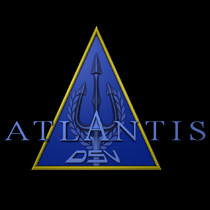As veterans amongst you would be aware, this modification didn't see a public release, although it was completed to an "Alpha" stage of production that served as a proof of concept. We proved it was quite possible to use a conventional 3D Real Time Strategy engine to turn Atlantis in to a game.
(Below: Screenshots and Assets from the 2006 Tides of War project...)



The future of this mod has been in question for some time. If it were not clear already, then I'll confirm now that the mod has halted production. It should be noted that not all the reasons for this decision were ours. Within three years of General's release in 2001, EA Games had already announced its successor, Command & Conquer 3: Tiberium Wars. Based on the same engine that ran Generals, C&C3 was larger, more advanced and better in virtually every way. In the development of Tides of War, we counted in this fact quite strongly, as the mod had been broken down in to two stages of development.
The first stage, intended to be developed for Generals, covered the majority of the gameplay mechanics, models, texturing and particle generators. The second stage of the mod would then be ported to the more flexible engine of C&C3 where it would be further refined for a public release.
This is where things got difficult, as C&C3's developer-released Modification tools were not as comprehensive as those for Generals. Effectively, this limited C&C3's mod potential to simple unit additions or basic modification of mechanics. It did not, however, allow for a comprehensive total-conversion of the game in to an underwater strategy epic.
This is what halted development of Tides of War, but - it should be noted - does not mean the project is dead and buried.
What exists now is the simple problem of finding a new engine with which to continue development, and while there are literally a dozen possibilities, none of them are particularly appropriate.
The first consideration I have of any title for the purposes of a mod is the immediately available community support. The Command and Conquer series is an excellent example of this kind of support - with millions upon millions of copies of the games sold, its easy to find a wide, vibrant and very alive community of gamers who can support your project. If a mod lacks this kind of support, it's an utterly uphill battle to survive. Support also dwindles with a game's age. While Generals was excellent in 2006, only a couple of years after its release, the community has since moved on to far better titles.
This obviously narrows the possible titles of a mod considerably. Of the more notable ones to survive that which are on the PC platform, we're left with the following examples of possible titles, and the reasons they won't work.
Supreme Commander:
Early in considering new engines, Gas Powered Games' Supreme Commander was considered for its absolutely epic scale of combat, real-time physics model and ease of modification. The real problem is that the game is simply too epic, with too much emphasis on atmospheric physics for underwater combat to be a serious consideration. With a lack of mapping tools and no ability to change the game's basic lighting models, it was also next to impossible to replicate a water environment.
Dawn of War, Company of Heroes:
Both from developer Relic entertainment, these two titles were considered as they shared the same basic engine model. Both were rejected because of their lack of 'flight' mechanics that are necessary to represent subfighters and larger capital ships. On the positive side, the mapping tools and physics engines were excellent.
Homeworld 2:
A true benchmark in PC RTS games, Homeworld 2 - again by Relic Entertainment - comes annoyingly close to what is needed to continue Tides of War. Indeed, a previous modification by indie mod-team Drunken Pirates attempted to turn Homeworld 2 in to a naval combat game, but were confronted with the annoying reality that this is a space game - it's true 3D, and Aircraft Carriers look ridiculous when moving vertically.
Similarly, as this is a space game, there is no room for land environments that we would need to use to represent the expansive ocean floor... Homeworld is a truly excellent game if you want to create any universe in space, and modders have made fine attempts at this with Battlestar Galactica, Star Trek, Star Wars, and even Robotec.
Command & Conquer: Red Alert 3
All the benefits of C&C 3... with none of the mod support. Red Alert 3 is about the least mod-friendly title in the series to date.
A thousand other B-list titles exist, such as the recent Stormrise, Star Trek: Legacy, Battlestations Midway, Tom Clancy's EndWar, Warhammer: Mark of Chaos and even ancient titles that still survive such as Star Trek: Armada, yet all have the same problems as the games mentioned above, and some are compounded by the fact that they are just fundamentally bad games.
The reality is that asking for a Real Time Strategy game that supports underwater modification, physics and customizable GUIs is hard to do. Until someone comes out with an A-list strategy game that can be modded with all these things in mind, then its very likely that Tides of War will remain on the backburner.
At present, the thing I am considering is a different genre of title. RTS is only one form of Strategy, and there exists many other very mod-friendly turn-based strategy titles out there such as Civilization IV, Galactic Civilizations II, or even Star Wars: Empire at War, that all support a very wide range of modding possibilities. With so few titles on the horizon... a new Tides of War project may be much closer than you think.
In other news, here's what's sitting on my computer screen right now:



